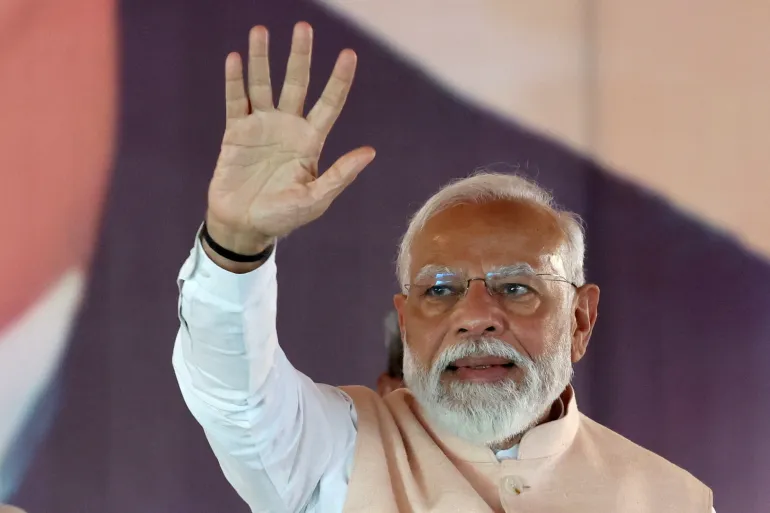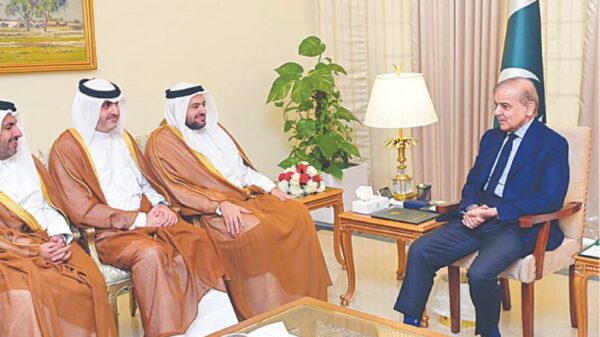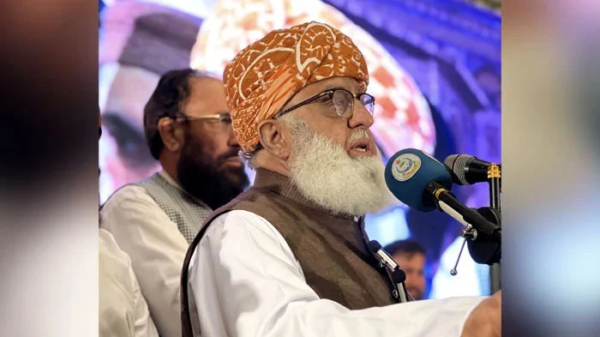In New Delhi, India, addressing a saffron-clad crowd of supporters in his native Gujarat earlier this week, Indian Prime Minister Narendra Modi tapped into an increasingly favored electoral theme – alleging collaboration between opposition parties and Muslims to seize control of the nation.
“The opposition alliance is urging Muslims to engage in ‘vote jihad’. This is novel because we’ve only heard of ‘love jihad’ and ‘land jihad’ so far,” Modi remarked, referencing a series of Islamophobic conspiracy theories, while underscoring to his audience why they should be apprehensive. “I trust you all understand the implications of jihad and who it’s directed against.”
As India’s mammoth national election approaches its midpoint, with the third of seven phases of voting slated for May 7, Modi’s anti-Muslim rhetoric is becoming more strident. This trend is causing concern among analysts and even Muslims who previously supported the prime minister but now fear that such rhetoric could inflame physical violence against Indian Muslims.
Modi’s recent comments followed a statement by a local leader of the opposition Samajwadi Party, Maria Alam, who addressed a gathering in the northern state of Uttar Pradesh, urging Muslims to engage in a “jihad” of “votes” as “that is the only jihad” they could undertake to oust Modi from power. After Modi’s Bharatiya Janata Party criticized her use of “jihad” in her speech, she clarified to the press that by “jihad,” an Arabic term for struggle, she meant to encourage Muslim voter participation.
However, in his address, Modi implied that a call for “vote jihad” posed a threat to the country’s democracy. Critics and opposition leaders, on the other hand, allege that the PM’s remarks, targeting India’s 200 million Muslims, are what pose a concern for India, particularly in the midst of a tense election, with 960 million voters registered to cast their ballots.
‘Infiltrators’, ‘invaders’, ‘looters’
During a campaign speech last week, Modi drew a parallel between the Muslim community and “infiltrators,” labeling them as “those who have more children,” catering to a prevailing Hindu majoritarian notion that Muslims have larger families with the intention of eventually surpassing Hindus in India. However, in reality, Muslims make up less than 15 percent of the national population, and government statistics indicate that their fertility rate is declining at a faster pace compared to that of Hindus and other major religious groups.
These remarks sparked a political controversy, eliciting strong criticism from the opposition and segments of civil society. Nearly 20,000 citizens petitioned the Election Commission of India to take action against Modi for his alleged hate speech.
However, just two days later, on April 23, Modi reiterated his stance, alleging a conspiracy orchestrated by the Congress — the primary opposition party — and Muslims to seize Hindu wealth. “I have exposed the truth to the nation that the Congress is plotting a deep conspiracy to seize your property and distribute it among their chosen few,” he declared, with reference to Muslims.
Then, on April 30, the BJP released an animated campaign video on Instagram depicting stereotypical portrayals of violent and greedy Muslim male raiders pillaging medieval India and looting its riches, only to be thwarted by Modi, who emerges as the savior of the nation. The video reinforced the PM’s claims that if the Congress were to win, they would redistribute Hindu wealth and assets among Muslims.
Although former Congress Prime Minister Manmohan Singh had stated 18 years ago that marginalized Indian communities, including Muslims, should have priority access to national resources, the Congress’s campaign manifesto makes no mention of redistributing wealth from one community to another. Other conspiracy theories recently cited by Modi include “love jihad” — the belief that Muslim men marry women from other faiths to convert them to Islam — and “land jihad” — the notion that Muslims are stockpiling land to gain control over India’s terrain.
Nilanjan Mukhopadhyay, a Modi biographer, finds none of this surprising, noting that religious polarization has been intrinsic to Modi’s politics for decades. “Indian democracy has been severely damaged by the BJP and Modi.”
“For Muslims in India, this is perhaps the most difficult time, as they constantly feel trapped by their identity.”
While Instagram removed the April 30 video following reports of hate speech, India’s election commission has yet to take action on complaints against Modi, drawing criticism from opposition leaders. “Modi has brought shame to the dignity of the PM’s office; his words are unfit for an Indian prime minister,” stated Congress legislator Pramod Tiwari, the leader of the opposition in the upper house of the Indian parliament. “Democracy is under threat in these elections, and the election commission of India is neglecting its duty.”
“The Congress party demands Modi’s disqualification as a candidate, and he should be prohibited from campaigning.”
‘Trigger more hatred’
Meanwhile, critics argue that Modi’s “hateful rhetoric” has increased the vulnerability of Muslims to violence. “These statements are likely to embolden Hindutva activists, who feel supported by the highest office in the country. They would perceive this as patronage,” explained Irfan Engineer, director of the Mumbai-based Centre for Study of Society and Secularism. Hindutva refers to the Hindu-majoritarian ideology of the BJP and its ideological mentor, the Rashtriya Swayamsevak Sangh (RSS).
“I hope these remarks do not fuel more hatred and violence – but that seems unlikely,” Engineer expressed, reflecting on his extensive experience monitoring communal violence and visiting affected areas with fact-finding teams. He noted that such speeches and rallies have historically incited violence in regions known for inter-religious harmony.
Amnesty International also voiced concerns about the ramifications of Modi’s remarks. “Institutions tasked with monitoring such speech during elections should hold those responsible accountable. However, we have unfortunately witnessed a tacit acceptance of such incitement and hostility by the Election Commission of India,” remarked Aakar Patel, the chair of the board of Amnesty International in India. “This widespread impunity underscores the continued and heightened discrimination experienced by Muslims in India.”
While Modi has previously depicted himself as a victim of opposition attacks, emphasizing his humble upbringing compared to the privileged backgrounds of many opposition leaders, he has now shifted the narrative to instill a sense of victimhood in the entire Hindu community, according to Engineer. “This represents the culmination of the Hindu nationalist movement, where all Hindus are portrayed as victims. Consequently, there is a call for a strong state with little room for democratic institutions, freedom of speech, or religious freedom.”
‘Subsumed by the individual’
Research indicates that in certain regions of India, albeit small, there is a gradual increase in Muslim support for the BJP. In Uttar Pradesh, India’s largest and politically significant state, Muslim support for the BJP rose from under 5 percent in 2012 to over 9 percent in 2022.
However, according to Mukhopadhyay, Modi’s biographer, even Indian Muslims who have previously supported Modi are now at risk. “Modi continues to target Muslims,” he asserted.
This became evident in the case of Usman Ghani, a young political leader from Rajasthan. Ghani, who once held a prominent position in the BJP’s minority wing, faced expulsion from the party and subsequent detention by local police in the BJP-governed state after criticizing Modi’s remarks against the Muslim community, which he described as “nonsense”.
“Modi has become a larger cult figure than anyone in the Hindutva movement,” Mukhopadhyay remarked. “Is this an election or a celebration of an individual?”
A political commentator based in New Delhi, who preferred to remain anonymous, suggested that Modi’s emphasis on anti-Muslim sentiments could be a response to lower-than-expected voter turnout in the initial phases of the national election. “Modi’s economic development narrative is losing credibility, so he’s resorting to polarization,” the commentator remarked.
Despite record-high unemployment, increasing income inequality, and regression in democratic measures, polls indicate that Modi remains the frontrunner for a third term in power.
“If the 2014 mandate was for development and 2019 for nationalism, now in 2024, Modi is more likely to believe that he won votes for polarization,” Engineer observed. “Anti-Muslim sentiment has become central to the BJP’s campaign.”










